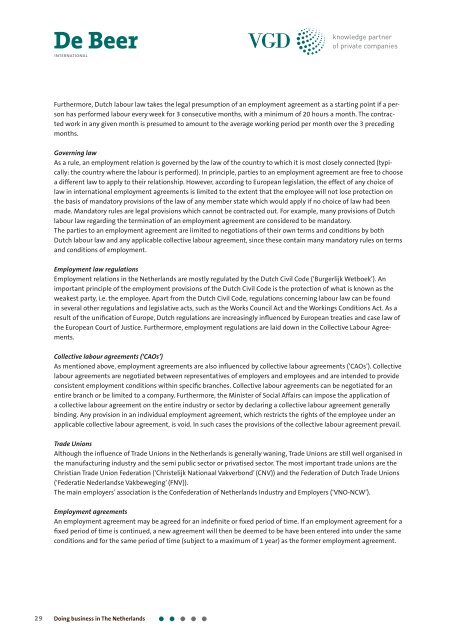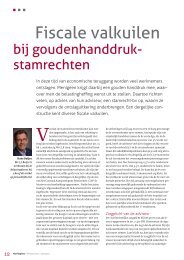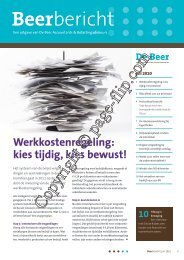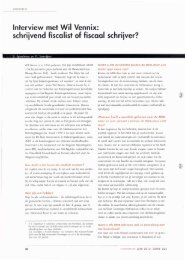De Beer
De Beer
De Beer
- No tags were found...
You also want an ePaper? Increase the reach of your titles
YUMPU automatically turns print PDFs into web optimized ePapers that Google loves.
<strong>De</strong> <strong>Beer</strong>INTERNATIONALknowledge partnerof private companiesFurthermore, Dutch labour law takes the legal presumption of an employment agreement as a starting point if a personhas performed labour every week for 3 consecutive months, with a minimum of 20 hours a month. The contractedwork in any given month is presumed to amount to the average working period per month over the 3 precedingmonths.Governing lawAs a rule, an employment relation is governed by the law of the country to which it is most closely connected (typically:the country where the labour is performed). In principle, parties to an employment agreement are free to choosea different law to apply to their relationship. However, according to European legislation, the effect of any choice oflaw in international employment agreements is limited to the extent that the employee will not lose protection onthe basis of mandatory provisions of the law of any member state which would apply if no choice of law had beenmade. Mandatory rules are legal provisions which cannot be contracted out. For example, many provisions of Dutchlabour law regarding the termination of an employment agreement are considered to be mandatory.The parties to an employment agreement are limited to negotiations of their own terms and conditions by bothDutch labour law and any applicable collective labour agreement, since these contain many mandatory rules on termsand conditions of employment.Employment law regulationsEmployment relations in the Netherlands are mostly regulated by the Dutch Civil Code (‘Burgerlijk Wetboek’). Animportant principle of the employment provisions of the Dutch Civil Code is the protection of what is known as theweakest party, i.e. the employee. Apart from the Dutch Civil Code, regulations concerning labour law can be foundin several other regulations and legislative acts, such as the Works Council Act and the Workings Conditions Act. As aresult of the unification of Europe, Dutch regulations are increasingly influenced by European treaties and case law ofthe European Court of Justice. Furthermore, employment regulations are laid down in the Collective Labour Agreements.Collective labour agreements (‘CAOs’)As mentioned above, employment agreements are also influenced by collective labour agreements (‘CAOs’). Collectivelabour agreements are negotiated between representatives of employers and employees and are intended to provideconsistent employment conditions within specific branches. Collective labour agreements can be negotiated for anentire branch or be limited to a company. Furthermore, the Minister of Social Affairs can impose the application ofa collective labour agreement on the entire industry or sector by declaring a collective labour agreement generallybinding. Any provision in an individual employment agreement, which restricts the rights of the employee under anapplicable collective labour agreement, is void. In such cases the provisions of the collective labour agreement prevail.Trade UnionsAlthough the influence of Trade Unions in the Netherlands is generally waning, Trade Unions are still well organised inthe manufacturing industry and the semi public sector or privatised sector. The most important trade unions are theChristian Trade Union Federation (‘Christelijk Nationaal Vakverbond’ (CNV)) and the Federation of Dutch Trade Unions(‘Federatie Nederlandse Vakbeweging’ (FNV)).The main employers’ association is the Confederation of Netherlands Industry and Employers (‘VNO-NCW’).Employment agreementsAn employment agreement may be agreed for an indefinite or fixed period of time. If an employment agreement for afixed period of time is continued, a new agreement will then be deemed to be have been entered into under the sameconditions and for the same period of time (subject to a maximum of 1 year) as the former employment agreement.29 Doing business in The Netherlands







